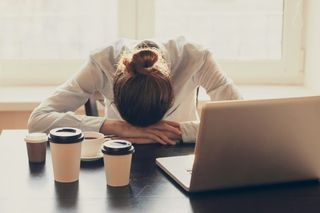New study suggests it is possible for 'night owls' to retrain their brains to become early risers

According to multiple studies, night owls are at greater risk of mental health issues than so-called 'larks.'
But according to a new study, a few simple tweaks to your routine could help people late to bed become early risers - thereby reducing the damaging effects of being a night owl.
Researchers from the University of Birmingham and Surrey conducted a study of 22 night owls, who went to bed on average at 2.30am every night, waking at around 10am.
For three weeks, they were asked to move forward their bedtime and wake-up by two/three hours. This stayed the same whether they were at work or not.
MORE:How to sleep better: The tried and tested tricks YOU can try tonight
In order to help them adjust to the new schedule, scientists advised that they get as much sunshine as possible in the morning, eat lunch at the same time each day, breakfast soon after waking up, and have dinner no later then 7pm - to help them become early risers.
And it seems that the easy tricks worked, with the participants reporting better productivity earlier in the day - chiming better with a normal working day.
Sign up for the woman&home newsletter
Sign up to our free daily email for the latest royal and entertainment news, interesting opinion, expert advice on styling and beauty trends, and no-nonsense guides to the health and wellness questions you want answered.
A professor at University of Birmingham’s Centre for Human Brain Health, Dr Andrew Bagshaw, explained, "Having a late sleep pattern puts you at odds with the standard societal days, which can lead to a range of adverse outcomes – from daytime sleepiness to poorer mental wellbeing.

“This [study] was successful, on average allowing people to get to sleep and wake up around two hours earlier than they were before.Most interestingly, this was also associated with improvements in mental wellbeing and perceived sleepiness, meaning that it was a very positive outcome for the participants."
The thought that being a night owl could have a detrimental impact on your mental health has been studied extensively. At the start of the year, researchers at the University of Exeter uncovered a causal link between having an evening chronotype (i.e. being a night owl) and being at increased risk of mental health issues, including anxiety, depression and schizophrenia.
MORE:B&M is selling a gel pillow that keeps you cool while you sleep – and it’s only £5
Studying thousands of adults, they found that those with the most ‘evening’ genes woke up 25 minutes later, on average, than those with the most ‘morning’ genes. And evening people were 10% more likely to develop schizophrenia, and more likely to be diagnosed with depression and anxiety.
So what's the reason behind it? Scientists think that, for night owls, having to work against your natural body clock at school and work puts you in a negative frame of mind, on top of not getting enough quality sleep.

‘Larks’ or morning people typically wake up by 6am feeling bright and alert and are able to fall asleep by 9pm. Night owls often need to sleep until 11am to wake up actually feeling refreshed, and struggle to fall asleep before midnight – awkward if you’re expected to work a standard 9-5 day.
About 10% of people fall into the lark category, while 20% qualify as night owls. The rest of us fall somewhere in between.
As well as the tips employed by the 22 people in the above survey, there are other ways to help your body wake up earlier, naturally.
Try sleeping with your bedroom curtains open so that you wake up to daylight, or use a daylight alarm clock. Then book out the weekend for a camping trip – research suggests the natural light exposure can alter your body’s circadian rhythm, making you more of a morning person.
Samantha Simmonds is a freelance journalist, content writer, copywriter, and editor based in London.
She graduated from Reading University with a First Class degree in Psychology, later achieving a Distinction in her Diploma in Fashion & Personal Styling from The London College of Style.
Samantha is currently creating digital editorial content for John Lewis, writing for The Edit's wellbeing channel. She also writes for publications including Women's Health, Top Santé, Refinery29, GoodtoKnow, Cosmopolitan, Healthy, Health & Wellbeing, woman&home, and Yahoo, and has created commercial content for brands including Berghaus, Amazon, and Regaine.
-
 Trinny Woodall's easy styling tricks are helping us get the quiet luxury look on a budget
Trinny Woodall's easy styling tricks are helping us get the quiet luxury look on a budgetYou don't need to break the bank to get a high-end look
By Charlie Elizabeth Culverhouse Published
-
 The secret behind Gillian Anderson’s chic, long-lasting eye makeup look is… lipstick
The secret behind Gillian Anderson’s chic, long-lasting eye makeup look is… lipstickHer makeup trick might seem unusual, but it's actually very handy
By Charlie Elizabeth Culverhouse Published